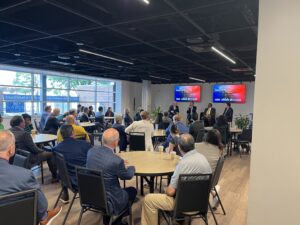Earlier this year, the Chamber’s Diversity and Inclusive Growth team held a DEI Forum on the impact of hiring from within communities of people with disabilities. This fireside chat featured April Lomax, Director, Corporate Workforce Diversity at BlueCross BlueShield of Tennessee who discussed the benefits of hiring from these diverse communities and shared best practices for companies looking to incorporate more equitable hiring strategies. In this exclusive TREND report, Lomax expands on these insights and shares some of the inclusive practices in place at BlueCross BlueShield of Tennessee.
According to data from the CDC, an estimated 26% of U.S. adults have some type of disability. That’s one in every four Americans, about 61 million people. And the percentage of people living with disabilities is highest in the South. It’s a significant number, and it’s one of several reasons we’re being intentional about disability inclusion at BlueCross BlueShield of Tennessee.
As a company, we have been advancing diversity for more than 20 years. Still, there is room for us to grow and broaden the conversation around D&I in all its forms – including disability inclusion – in Chattanooga and the communities we serve statewide.
For our employees with disabilities, we believe advocacy and understanding are critical to their success in the workforce. When these employees feel supported, they are better equipped to serve our members, especially those who share similar life experiences.
It’s important that companies seeking to improve disability inclusion understand their “why.” What positive impact can disability inclusion have on your employees and business? When you identify this, you’ll be more authentic – and intentional – in your journey. Acknowledge the need to “talk about things out loud” and bring these important conversations to the forefront.
Once you’ve defined your “why,” a good place to start your journey is evaluating your recruiting and retention practices.
When it comes to recruiting, you should strive to make the hiring process as inclusive as possible. This includes updating your external-facing assets so candidates with visual or hearing impairments can apply without difficulty. At BlueCross, we have accessible job descriptions, and we’re actively updating our company website and digital materials to improve accessibility. The effort is being spearheaded by an employee who self-identifies as visually impaired and works in our digital marketing team.
It’s also critical to actively recruit employees with disabilities, and sometimes this means forming new, innovative partnerships. In 2018, we established Chattanooga’s first Project SEARCH program. This initiative provides high-functioning young adults with intellectual or learning disabilities the opportunity to earn immersive workforce experience and develop the skills that help them seek – and find – competitive employment.
Enhancing our recruitment practices is an ongoing effort, and while we realize we have not “spiked the ball,” we are committed to making it a more inclusive process on all fronts.
Recruiting is only part of the equation, though. Once you have hired talented employees with disabilities, you need to find a way to keep them, and that’s where a retention strategy comes into play.
Like many other companies, we have become increasingly reliant on technology in the wake of COVID-19. So, in terms of retaining employees, this is a good place to start. How is your company using technology now, and how can you utilize it to improve the work experience of your employees with disabilities? For us, this means making sure our employee intranet is accessible and that all our video content has closed captions, quality audio and transcriptions available for download.
Technology also helps remove a significant barrier for employees with disabilities – transportation. Ensure that these members of your team have what they need to work productively from their homes or the office. Our medical accommodation process allows employees with disabilities to apply for modifications to their positions, such as adjusted work schedules or equipment, so they can successfully complete their job duties.
And lastly, work to make sure they feel included. Our Valued Abilities employee resource group promotes cooperation and accessibility in the workplace, as well as better understanding of our colleagues with disabilities.
Disability inclusion should be a priority for all of us – in Chattanooga and beyond. I’m proud of the work we’ve done at BlueCross, and I’m excited to see where we’ll be in the next few years.
Learn more about BlueCross and BlueShield of Tennessee, here.
Watch the DEI Forum on Workers with Disabilities, below:
Featured image courtesy of BlueCross BlueShield of Tennessee









